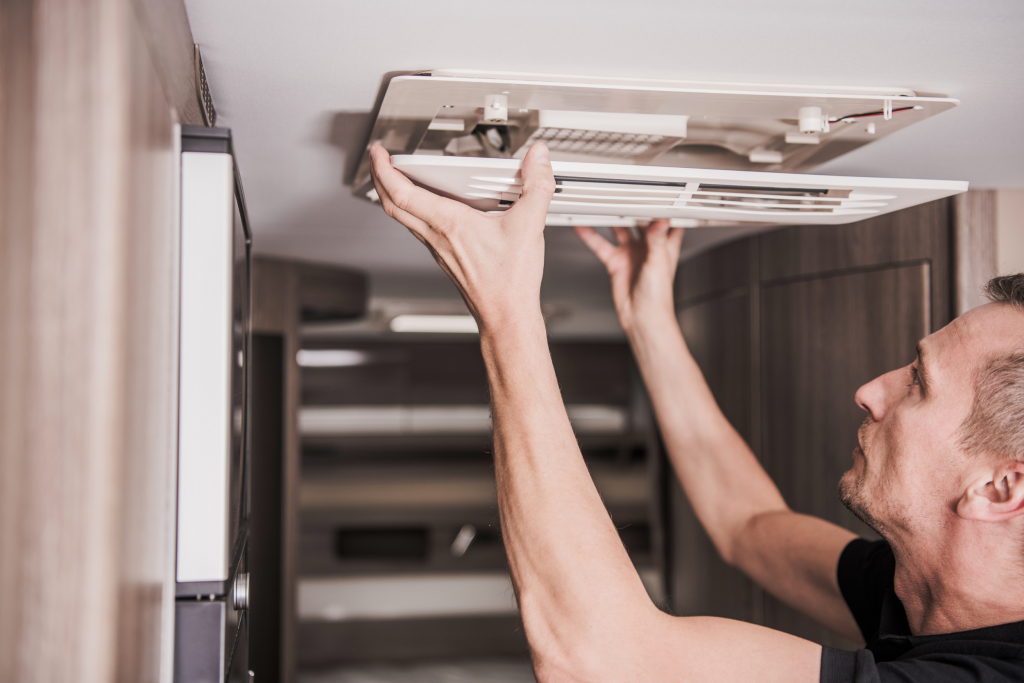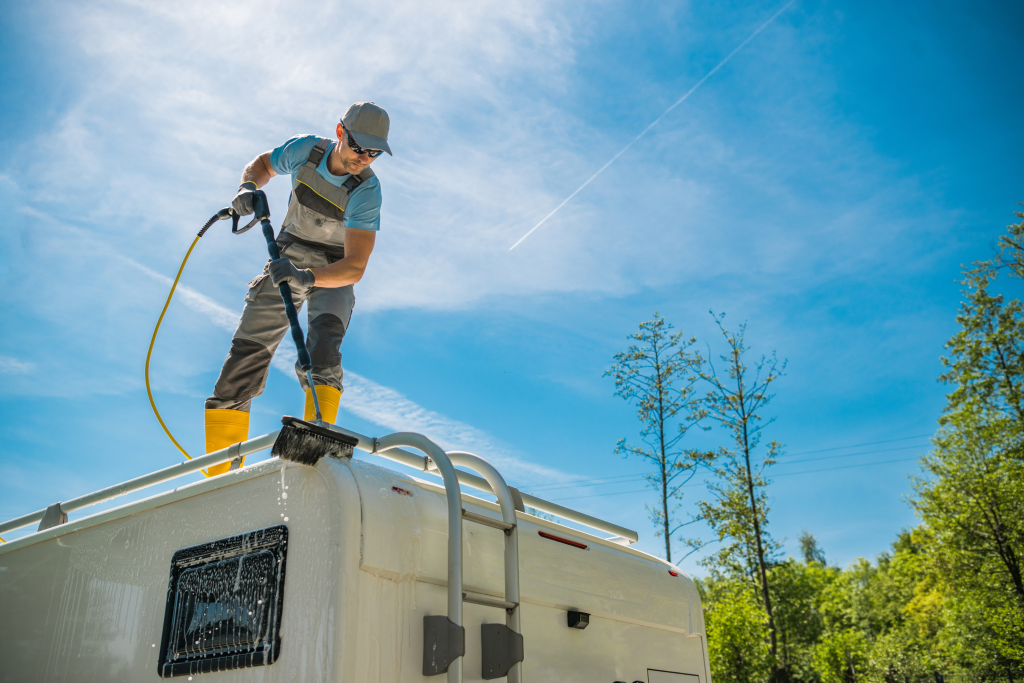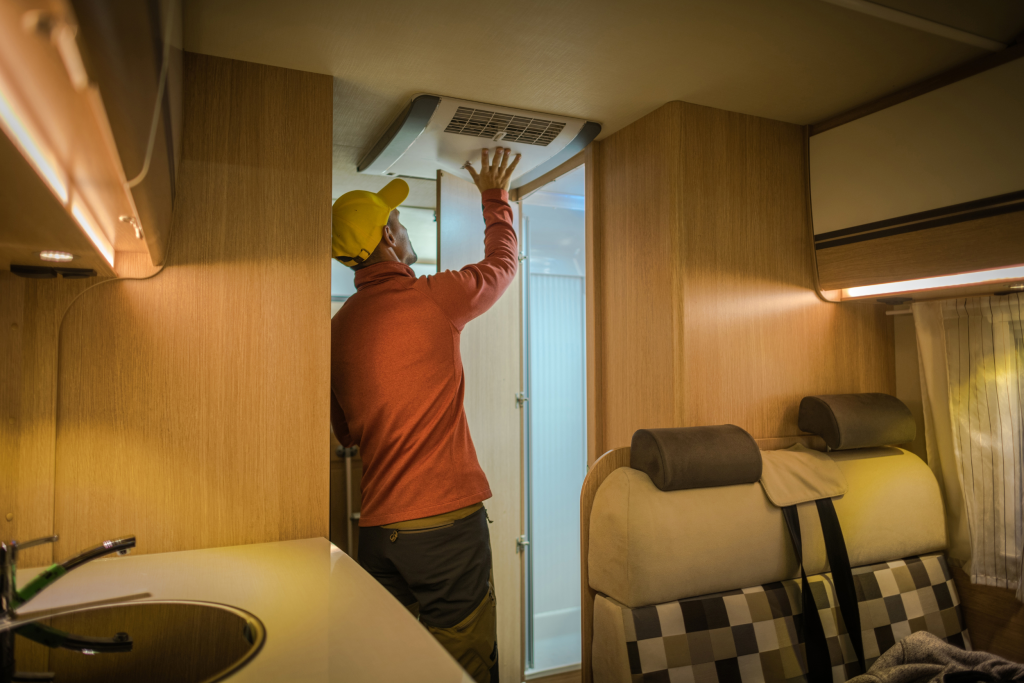
The increasing allure of recreational vehicle (RV) travel necessitates an understanding of the various types of RVs and the imperative regular maintenance required to ensure their optimal performance.
The initiation of the RV history can be traced to the early 20th century when the concept of mobile living became popular. As the trend for RVing grew, so did the realization of the importance of regular upkeep.
Travel tips often stress the significance of adhering to a maintenance schedule for the longevity and safety of the vehicle. Various classes of RVs, such as Class A, B, and C, as well as fifth wheels and travel trailers, each have specific maintenance needs that must be addressed to keep the home on wheels running smoothly.
Key Takeaways
- RV maintenance is important for maximizing efficiency, reducing the likelihood of expensive repairs, promoting emergency preparedness, ensuring reliable performance, and enhancing the overall traveling experience.
- Adhering to an RV maintenance checklist assures a smooth journey, reduces unexpected costs, enhances the overall traveling experience, and should be a primary priority for every RV owner.
- Maintenance manuals, spare parts lists, and troubleshooting guides are essential references for maintaining smooth operation and a worry-free RV experience.
- Proper RV maintenance maximizes cost management, reduces the likelihood of sudden, expensive repairs, promotes emergency preparedness, provides assurance of reliable performance, and enhances the overall traveling experience.
Understanding Your RV
Gaining comprehensive knowledge of your recreational vehicle’s unique intricacies and systems is a crucial first step in ensuring its longevity and optimal performance.
Familiarity with different RV types, from Class A motorhomes to travel trailers, is essential as each has unique maintenance needs.
A fundamental understanding of RV appliances such as the air conditioning system, refrigerator, and water heater is also beneficial as these are common sources of issues.
Furthermore, awareness of the coverage provided by RV insurance is a key aspect of this understanding, as it can significantly impact decisions regarding maintenance and repairs.
Utilizing the RV’s manual can help gain this knowledge, offering detailed insights into its specific requirements and promoting a proactive approach to maintenance.
Exterior Maintenance

Maintaining the exterior components of a recreational vehicle is crucial for preserving its aesthetic appeal, functionality, and overall value. Key components to focus on include roof sealing, tire care, and awning maintenance.
Regular inspection and roof sealing prevents water intrusion, a leading cause of structural damage.
Tire care is essential in ensuring safe and smooth travels. Regular checks for proper inflation, tread wear, and signs of aging can prevent accidents or breakdowns.
Awning maintenance, a frequently overlooked aspect, is vital for the longevity of the awning material and its mechanisms. Cleaning and conditioning the awning, inspecting for damage, and ensuring it is dry before storage can prevent mold, mildew, and mechanical issues.
These practices are instrumental in extending the lifespan of an RV and preserving its value.
Interior Maintenance

Proper upkeep of the interior elements of a recreational vehicle, such as the appliances, plumbing, and air conditioning system, is equally as crucial as the exterior for ensuring a comfortable and safe journey. Attention must be given to Upholstery Care, which includes cleaning and maintaining seat covers and cushioning material. These components can harbor bacteria if not maintained, leading to health risks.
The Ventilation System, responsible for maintaining air quality and temperature, requires regular inspection and cleaning. In addition, Pest Prevention is a key element of interior maintenance, requiring vigilance to prevent infestations that can damage the vehicle and pose health hazards.
Therefore, a comprehensive maintenance checklist is vital for the smooth operation of these interior elements.
Engine and Drive Train Maintenance
Ensuring the optimal performance of the engine and drive train in a recreational vehicle necessitates regular and meticulous servicing. The heart of this maintenance revolves around consistent oil changes, which lubricate the engine’s moving parts and prevent overheating.
Furthermore, brake inspections are also essential, as they contribute significantly to the safety and functionality of the RV. This process involves checking for wear and tear on the brake pads, ensuring the brake fluid is appropriate, and inspecting the brake lines for leaks or damages.
In addition, transmission care, including regular fluid changes and inspections, can prevent costly damage to the vehicle’s drive train. Regular maintenance of these key components enhances efficiency and extends the recreational vehicle’s lifespan.
Regular RV Systems Checks
Regular inspections of integral recreational vehicle systems such as water, waste, and propane can significantly contribute to the vehicle’s functionality and safety. Battery upkeep is a crucial component of these checks, ensuring the reliable operation of all electronic systems. Regular checks can prevent battery failure, which could lead to a breakdown or other issues.
Similarly, tire inspections are essential for road safety, checking for wear and tear, and maintaining proper inflation levels.
Plumbing checks, including the inspection of both fresh water and wastewater systems, are also necessary. These checks ensure the correct operation of essential facilities such as showers, toilets, and faucets and can prevent damage caused by leaks or blockages.
In conclusion, regular system checks are an indispensable aspect of RV maintenance.
Preparing Your RV for Storage
Transitioning to a period of inactivity requires comprehensive preparation for a recreational vehicle to minimize potential damage and ensure its readiness for subsequent use. Central to this process is storage location considerations, emphasizing selecting a suitable environment that offers protection from adverse weather conditions and potential vandalism.
In addition, pest prevention strategies should be implemented, involving thorough cleaning of the RV to eliminate food traces and using pest deterrents. Furthermore, moisture control methods are integral, as excessive humidity can lead to mold and mildew. This can be achieved through proper ventilation and the use of dehumidifiers.
Adhering to these guidelines can enhance an RV’s lifespan and guarantee optimal performance when needed.
Seasonal Maintenance

Following the prudent steps outlined for preparing your recreational vehicle for storage, addressing the requisite seasonal maintenance measures is equally critical. This involves a comprehensive approach, incorporating Winterizing Essentials and Springtime Preparations to ensure your mobile home’s longevity and optimal performance.
During the winter, it’s indispensable to implement various winterizing essentials such as draining and bypassing the water system, checking for any cracks or damages that may allow cold air to infiltrate, and ensuring the RV is properly insulated.
As spring arrives, preparations should include de-winterizing the water system, inspecting the seals and seams, and checking the tire pressure.
Undertaking these Seasonal Safety measures not only enhances the durability of the RV but also ensures a safe and smooth journey for its inhabitants.
Professional RV Maintenance
While seasonal upkeep of a recreational vehicle is crucial, situations may arise where the expertise of a professional service center becomes indispensable to ensure the long-term functionality and safety of the vehicle. Recognizing such circumstances and seeking professional help promptly is important to avoid exacerbating the problem.
The frequency of these Service Intervals largely depends on usage and manufacturers’ guidelines and should not be overlooked to keep RV Warranty Coverage intact.
Maintenance Costs, although potentially higher in a professional setting, are justifiable as they ensure quality workmanship and the use of appropriate tools and parts. Moreover, these costs can prevent more expensive repairs in the future, making it a prudent investment in the longevity and performance of the recreational vehicle.
Conclusion: Ensuring Safe and Enjoyable Journeys Through Regular RV Maintenance
The necessity of regular and professional care for recreational vehicles cannot be overstated, as it ensures the preservation of the vehicle’s value and performance and the safety and enjoyment of its occupants.
It is fundamental to consider traveling tips and guidelines to maximize the efficiency of the RV. Proper maintenance aids in cost management, reducing the likelihood of sudden, expensive repairs. It also promotes emergency preparedness, ensuring the vehicle will perform reliably in various conditions.
Therefore, adherence to the described RV maintenance checklist is paramount. It assures a smooth journey, reduces unexpected costs, and enhances the overall traveling experience. Hence, maintaining an RV should be considered a primary priority for every RV owner.